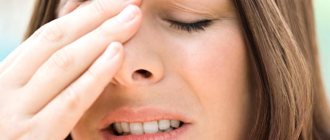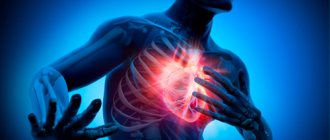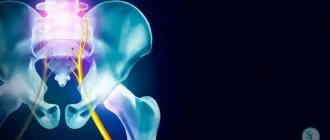In medicine, it is not for nothing that there is a separate term for the 5-7 days preceding menstruation - premenstrual syndrome or PMS. It is at this time that the vast majority of women experience rather unpleasant symptoms: discomfort and pain in the lower abdomen and lower back, mood swings, increased nervousness and irritability, general weakness, etc. In addition, the most common manifestations of PMS include insomnia before menstruation or during menstruation itself, aggravating the already unstable emotional state of a woman during this period. What are the causes of such sleep disturbances, and how can you restore your body’s ability to get a good night’s rest?
PMS - what is it?
PMS is not a disease, but a set of symptoms that are characterized by cyclicity and are closely related to the menstrual cycle. More than 90% of menstruating women are susceptible to PMS, the nature of which has about 100 different symptoms and causes (hormonal imbalance, stress, poor diet).
Premenstrual syndrome, also premenstrual tension syndrome, premenstrual illness, cyclic syndrome (PMS) is a complex cyclic symptom complex that occurs in some women in the premenstrual days (2-10 days before menstruation) and is characterized by psycho-emotional, vegetative-vascular and metabolic-endocrine disorders, which, in turn, negatively affect a woman’s usual lifestyle.
Many studies show that people are sure that in most cases female irritability is caused by PMS. What is premenstrual syndrome in women interests many people. However, in fact, the cause of its occurrence is not always associated with psychological reactions (irritation, nervousness). PMS is a system of vegetative-vascular, psycho-emotional and endocrine disorders that occur after ovulation and before the start of the menstrual cycle. Scientists believe: this condition is a consequence of the maturation of the egg and is always accompanied by a sharp drop in hormones (estrogen, progesterone) in the female body.
Some women may not notice hormonal changes, others feel them, but this does not have a strong impact on the usual rhythm of life. However, there is a category of women for whom hormonal fluctuations are critical, which leads to a sharp and prolonged deterioration in well-being. Most often, “menstrual” symptoms (bloating, headache, fever, irritability, moodiness) are typical for women over 30 years old. Sometimes symptoms can intensify due to age-related changes, for example, with the approach of menopause (perimenopause) - a physiological stage associated with the gradual decline of the reproductive function of the female genital organs.
Features of the female body
A woman’s body is a very complex system, the main purpose of which is the continuation of the human race and the ability to bear children. That is why every month every representative of the fair sex, starting from about 13-14 years old, faces a problem of an intimate nature, in which blood is released from the genital tract along with mucus.
The menstrual cycle is a period of time that is counted from the first day of menstruation to the first day of the next menstruation. Typically, the duration of the menstrual cycle depends on the individual characteristics of a particular female body, as well as on some other factors.
What are the symptoms before menstruation?
Frequent changes in mood, the appearance of headaches and pain in the back and lower back, as well as discomfort in the chest area may indicate that a woman is experiencing premenstrual syndrome. How many days it takes for PMS to set in and what symptoms it manifests itself in has not been precisely established by science. Everything is individual and depends on the woman’s health and general well-being.
Psychological symptoms of PMS:
- anxiety, irritability, tearfulness, feeling of depression;
- frequent and sudden mood changes;
- sleep problems - insomnia, constant awakenings at night, daytime sleepiness;
- loss of strength, lethargy and passivity;
- absent-mindedness, difficulty concentrating.
Physical symptoms of PMS:
- soreness of the mammary glands, an increase in their volume;
- swelling, sometimes quite noticeable;
- migraine or dizziness;
- nausea and vomiting;
- back and joint pain;
- thirst, which is accompanied by frequent urination;
- gastrointestinal disorders;
- attacks of rapid heartbeat, fever;
- the appearance of skin irritations;
- food cravings - mainly sweet and salty.
In most cases, signs of psycho-emotional and physical discomfort disappear after the first days of menstruation. If the symptoms manifest themselves clearly and often bother a woman, she should seek help from a gynecologist. Also, medical supervision is required for menstruation in adolescents, which are often accompanied by the appearance of dermatological problems (acne, acne) and disturbances in the functioning of the sweat glands (increased sweating).
Proper treatment for insomnia
If insomnia occurs during PMS, you should consult a doctor and undergo an examination to rule out more serious gynecological pathologies. Therapy must be comprehensive. First you need to try to eliminate the problem without pills. If this cannot be done, the doctor will prescribe appropriate medications.
Drugs and purposes for their use
In most cases, the pathological condition can be dealt with at home. However, sometimes medication is required.
| Group of drugs | Name of medicine | What is it used for? |
| Vitamins | "Pikovit", "Supradin" | They replenish the amount of vitamins and microelements in the body, the level of which decreases before menstruation. In this way, the functioning of the nervous system can be stabilized. It is important to use complexes containing calcium, magnesium, and B vitamins. |
| Diuretics | "Uregit", "Furosemide" | They eliminate swelling, which is often present with PMS. However, they are prescribed only in extreme cases, since these medications contribute to the leaching of microelements, which are already in short supply in the body during this period. |
| Hormonal | They are used only if there are serious disturbances in the functioning of the reproductive organs. | |
| Antidepressants, sedatives, tranquilizers | "Fluoxetine", "Amitriptyline", "Novopassit", "Glycised" | Such drugs help normalize a woman’s emotional and mental state and improve the functionality of the nervous system. |
| Sleeping pills | "Sanval" | Thanks to such means, the patient has the opportunity to relax. But these drugs are prescribed as a last resort. |
| NSAIDs | "Diclofenac", "Nurofen" | Anti-inflammatory drugs are used in the presence of pain in the abdomen and lower back, headaches. |
Any medications must be prescribed by a doctor. Self-medication in this case is unacceptable.
Folk recipes
If insomnia occurs every month, then it can be dealt with using herbal decoctions. However, this method of therapy must first be agreed with a doctor. The following recipes will be useful:
- Melissa tea. Requires 1-2 tsp. dry herbs and 1 glass of boiling water. It takes 20 minutes to infuse. Next, the liquid is cooled and filtered. Should be taken after every meal. To improve the taste, you can add honey to tea.
- Dill. For cooking, take 1 tbsp. l. greens or 1 tsp. seeds The raw materials are poured with a glass of boiling water. You need to infuse the liquid for 2 hours. After straining, the medicine can be consumed half a glass three times a day. Reviews about this product are good.
- Hop decoction. Need 1 tbsp. l. Pour a glass of boiling water over the crushed cones and leave for 15 minutes. The liquid should be cooled and diluted with honey. Take half a glass twice a day. Treatment lasts about a month, after which there is a two-week break.
Pumpkin and bananas (an anti-stress remedy) also help during insomnia.
Additional Tips
If a woman ovulates, serious changes occur in her body. The menstrual cycle is the main factor in the manifestation of insomnia; the condition can be improved with the help of the following tips:
- A few days before or during menstruation, you should avoid alcohol and caffeine-containing drinks.
- Walking outdoors more often in the evening will help you fall asleep faster.
- Use soothing essential oils.
- Before going to bed, the room needs to be ventilated.
- You should go to bed at the same time.
- Eat right, avoiding fatty and fried foods.
These measures will help get rid of the problem without medications.
How many days before your period does PMS start?
For most women, PMS begins 2-10 days before menstruation; the discomfort ends with the onset of menstruation. If a woman notices a regular deterioration in her well-being as a woman, she needs to see a doctor, because it could be PMS. The reasons for the deterioration of well-being and the development of premenstrual syndrome can be different and are determined by a gynecologist, and in some cases the supervision of an endocrinologist or other highly specialized doctor (neurologist, psychologist) is required.
Throughout life, under the influence of many factors (due to lifestyle, poor diet, stress, hormonal disorders, inflammatory processes in the body), the signs of PMS can change. Premenstrual syndrome, which is treated by a gynecologist, can aggravate a woman’s existing health problems. For example, studies have shown that in women diagnosed with myalgic encephalomyelitis or chronic fatigue syndrome, PMS leads to heavy menstrual bleeding or premature menopause.
How to distinguish PMS from pregnancy?
To distinguish PMS from pregnancy, you need to visit a gynecologist. Premenstrual syndrome, the symptoms of which vary from woman to woman, can resemble signs of early pregnancy and cause pain in the chest, frequent mood swings (attacks of sadness and apathy, tearfulness), and other ailments.
Pregnancy and PMS are caused by hormonal changes, so it's easy to confuse the two. If your bad mood persists for two weeks or more, seek medical help. According to the World Health Organization, doctors diagnosed mental disorders, in particular depression, in 10% of pregnant women.
Hormonal fluctuations are often the cause of female constipation, which can be aggravated by excessive consumption of confectionery, fatty foods, smoked foods and sweet soda. Research shows that constipation affects up to 38% of women, not only before menstruation, but also during pregnancy. In the first case, constipation most often appears against the background of intestinal diseases, the aggravation of which occurs under the influence of PMS, in the second - due to significant changes in the body due to the natural formation of the fetus, which is most often characteristic of the first two trimesters.
Common signs of PMS and pregnancy also include:
- changes in the breast, which may include pain, swelling, tenderness. With PMS, they are felt before the menstrual period, and disappear after it begins or ends. In the first months of pregnancy and before childbirth, the breasts become heavier, touching the area around the nipple can cause pain, and the veins located in the chest become more pronounced;
- fatigue. In some pregnant women, it is observed only during the first trimester, in others it persists throughout the entire 9 months until the onset of labor. Along with fatigue, a woman preparing to become a mother may periodically experience “menstrual” ailments, however, as a rule, they disappear within 1-2 days;
- bleeding. In early pregnancy, small blood stains may appear on your underwear. This is called implantation bleeding, which most often occurs 10 to 14 days after fertilization. Many women do not notice such discharge or confuse it with menstruation. You need to understand that menstrual bleeding lasts at least 4-7 days and causes significant blood loss, which is difficult to miss;
- spasms. In early pregnancy, they are similar to menstrual cramps and mostly occur in the lower stomach. In a pregnant woman, cramps may persist for several weeks or months (the reason is the development of the fetus in the womb).
How to get rid of irritability during PMS?
To get rid of irritability a week before or during menstruation, you need to undergo treatment with a gynecologist. Irritability is one of the characteristic psycho-emotional symptoms of PMS. Temperature, pain and other physiological sensations increase the manifestation of psycho-emotional disorders. Without the help of a doctor, it is impossible to control hormone levels and associated PMS symptoms. How many days in advance you need to take the prescribed medications depends on how pronounced the discomfort is and how often it bothers you. In most cases, irritability is accompanied by anger, anger, or a feeling of increased anxiety. Depending on the stability of the emotional state, a woman may be prescribed broad-spectrum sedatives.
Healthy food (normalizes blood sugar levels, improves metabolism) and regular physical activity (maintains muscle tone) help maintain a good mood and well-being during irritability. In order not to aggravate the manifestation of irritability, it is necessary to avoid caffeinated drinks and other stimulants.
Useful video
Watch this video about the causes and treatment of insomnia:
Similar articles
- How to sleep during menstruation without “surprises”
Many girls are interested in the question of how to sleep during menstruation in order to avoid leakage. To do this, you should use special hygiene products, as well as tips for arranging your home. Read more - Premenstrual syndrome: symptoms, diagnosis...
Quite unpleasant premenstrual syndrome can be of four types, so the symptoms will differ. Diagnosis of a woman’s condition with PMS is carried out by several specialists. Treatment with drugs to relieve tension is selected strictly individually. Read more
- Bacterial vaginosis during menstruation
An unpleasant odor reminiscent of fish may indicate the presence of bacterial vaginosis, during menstruation the symptoms of which are much more pronounced due to changes in hormonal levels and a decrease in defenses. Read more
- Headache during menstruation: causes, treatment
Identifying the reasons why you get a headache during your period can be difficult. After all, discomfort is provoked by hormonal changes, problems with blood vessels, poor lifestyle, and many others. You can get rid of headaches during menstruation with medications and folk remedies. Read more
How to treat PMS?
Contact your gynecologist to relieve your PMS symptoms. The doctor will tell you how to deal with unpleasant sensations before menstruation and not harm women’s health after collecting an anamnesis and gynecological examination of the patient. Based on the examination results, the doctor makes a diagnosis of PMS. The gynecologist gives an explanation of the regimen for taking prescribed medications. Do not self-medicate so as not to worsen the situation.
To treat PMS use:
- medications (painkillers, antidepressants, diuretics);
- hirudotherapy (treatment with leeches);
- aerobic physical activity (cardio exercise), in which oxygen serves as the source of energy to maintain muscle function;
- diet (gradual transition to a healthy menu, avoiding excessive consumption of caffeine, salt and sugar two weeks before the start of menstruation).
Anecdotal research suggests that certain vitamins and minerals may help relieve menstrual discomfort. These include calcium, magnesium, vitamin B6, polyunsaturated fatty acids (omega). However, the Food and Drug Administration (FDA) does not recommend unauthorized use of vitamin complexes and supplements, as this can cause menstrual dysfunction. Before taking them, you should consult your doctor.
You also need to give up bad habits (smoking, drinking alcohol), avoid stressful situations, yoga and meditation, massage are recommended. According to the study, women who smoke reported more PMS symptoms than non-smokers. Problems in the family and at work, lack of sleep, and restless sleep can aggravate the situation. Women's periods should be regular and not cause significant harm to women's well-being and health. A gynecologist will help solve problems with the menstrual cycle and prevent dysfunction of the ovaries and other female genital organs.
1
1
6
Article rating:
5 out of 5 based on 7 ratings
Author: Filatova Tatyana Sergeevna
Obstetrician-gynecologist. First category. Work experience over 18 years.
Diagnostics
The diagnosis of PMS is made based on the medical history, the patient’s complaints, and the results of a diagnostic examination. Diagnosis of poor sleep before menstruation is carried out as part of a comprehensive examination. Polysomnography is a method for determining sleep parameters. The study reveals breathing disorders during sleep (night apnea), snoring, eye movements, and pathological motor activity.
Polysomnography also shows the concentration of oxygen in the blood, the tone of the facial and cervical muscles. Differential diagnosis is carried out in relation to pathologies that manifest similar symptoms (hypothyroidism - decreased concentration of thyroid hormones, anemia, autoimmune reactions, mental illness).








